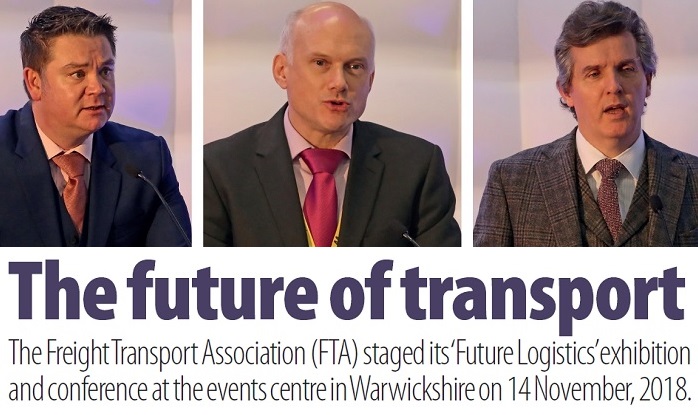The Freight Transport Association (FTA) staged its ‘Future Logistics’ exhibition and conference at the events centre in Warwickshire on 14 November, 2018.

The event was well attended and included three seminar theatres looking respectively at: Tools, technologies and the future of transport; Managing people in a connected world; and developing strategies to optimise operations.
Subjects for discussion included: autonomous vehicles, the implications of Brexit, alternatives to truck ownership, training, the gig economy, in-cab technologies and opportunities for 5G and ultra connectivity.
In a discussion about clean air zones, inevitable at such a gathering, Richard Foster, Commercial Assistance Manager from the Automobile Association (AA) said currently 56% of vehicles run on diesel. He said that fleet operators were frustrated because successive governments had sold the virtues of diesel fuel and are now saying that operators have bought the wring thing. Electric vehicles are getting better and one-third of operators are expecting to be using them in the next five years. But there is a limited supply of the right kind of electric vehicles, the charging infrastructure is inadequate, and there are problems with cost and functionality. What’s more the UK government has recently removed the grant available for plug-in hybrid vehicles.
The sector wants to take a leading role in improving air quality but it doesn’t feel that it should be singled out,” he said. “It will require a change in government policy and financial incentives to make people shift.”
Christopher Snelling, Head of UK Policy for the FTA said there was a fundamental lack of understanding about what makes good sense in terms of efficient urban transport. He said that everyone accepted that a bus is more environmentally efficient than a car because it carries more people at one time. However, when it comes to lorries everyone perceives smaller vehicles to be cleaner and safer. But to deliver the same amount of goods as an LGV it would take multiple small vans which, collectively, create more pollution, take up more space, and are a much greater hazard.
David Thackray from Tevva presented his companies technology for extending the range of electric vehicles. David explained that the system added a small on-board generator to charge the batteries of an electric vehicle while in motion. He claimed it would reduce the cost of running a 7.5 tonne vehicle by £820 per 1000 litres of fuel used.
Tickets for the event were just £150. Although much of the content was not directly related to the moving sector it did give a good insight to the trends in the industry, how technology can help fleet operators, and what the future might hold.
Photo: Richard Foster, AA; Christopher Snelling, FTA; David Thackray, Tevva